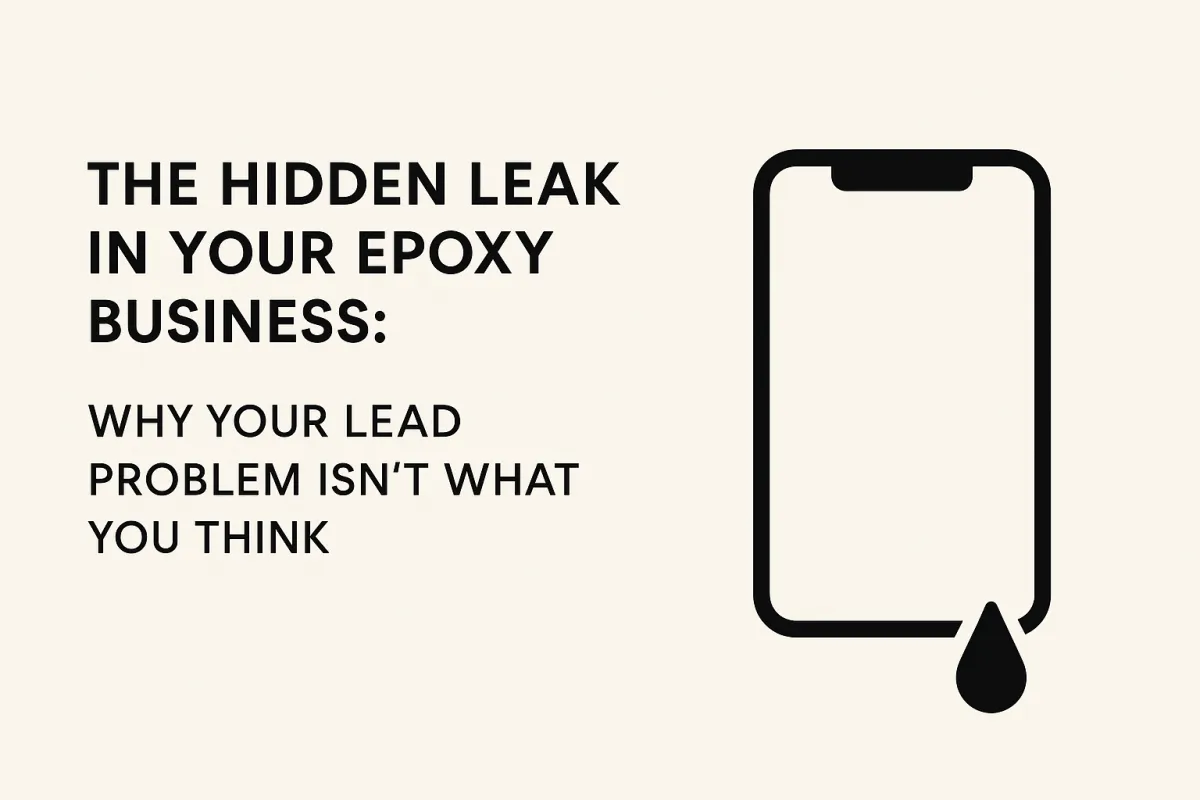
The Hidden Leak in Your Epoxy Business: Why Your Lead Problem Isn't What You Think
The Hidden Leak in Your Epoxy Business: Why Your Lead Problem Isn't What You Think
The Real Crisis Isn't Lead Generation
The Math Behind Your Missing Money
The Three Hidden Costs of DIY Lead Management
Where Most Contractors Go Wrong With Lead Management
The Automation Revolution in Specialty Contracting
Real Talk: What This Actually Looks Like Day-to-Day
The Three Pillars of Epoxy Business Automation
The Contractor's Crossroads: Which Path Will You Choose?
You're staring at your phone again.
It's 9:37 PM, you just finished a 12-hour day pouring a metallic floor in that lakehouse basement, and now you're trying to remember which homeowner you promised to call back about that garage quote.
Was it the Johnson project? Or that commercial kitchen lead from last Tuesday?
You're not short on leads. You're short on time, patience, and clean follow-through.
Let's be brutally honest here. Your phone is full of screenshots, your email is overflowing, and your text messages have turned into a digital graveyard of half-started conversations. Some hot, some cold, all of them requiring your attention when you're already stretched thinner than a first coat of primer.
The Real Crisis Isn't Lead Generation
Most epoxy contractors think their business would flourish if they just had "more leads."
But look around your digital world right now:
You've got a dozen conversations open in various stages
Half are tire-kickers who ghost after the first price mention
Several seemed promising but have gone cold because you forgot to follow up
A handful are actually ready to book, but they're buried under everything else
And at least three "sure things" slipped through your fingers last month while you were mid-pour or simply burned out from juggling it all
Sound painfully familiar?
Here's the truth that most marketing agencies won't tell you: you don't have a lead generation problem. You have a lead management crisis.
And it's costing you thousands every month in lost revenue.
The Math Behind Your Missing Money
Let's do some uncomfortable math for a second.
The average residential epoxy project runs between $3,000-$8,000. If you're doing metallic work, specialty applications, or larger square footage, you're easily hitting $10,000+ per job.
Now, how many leads slipped through your fingers last month because your follow-up system consists of:
Mental notes you make while troweling
Phone reminders you dismiss when they inconveniently pop up
Hastily scribbled names on invoices you can't find
The infamous "I'll get back to them tomorrow" promise you make to yourself
If it's even 2-3 quality leads per month (and we both know it's probably more), that's potentially $15,000-$30,000 in lost revenue.
Not because you can't do the work. Not because your craftsmanship isn't excellent. Not because your pricing is off.
But simply because you're the only one following up, and you're drowning in the day-to-day demands of running your business.
The Three Hidden Costs of DIY Lead Management
Beyond the obvious financial impact, there are three deeper costs to being stuck in this cycle:
1. The Quality Cost
When you're spread thin trying to manage everything yourself, your actual work quality can suffer. Either you rush jobs to make time for sales calls, or you ignore leads to focus on craft—neither is sustainable.
Think about your last rushed project. The one where you cut corners just slightly because you had three estimates to write that night. That's not the reputation you want to build.
2. The Growth Ceiling
There's a natural cap to how much you can grow when you're personally responsible for:
Estimating every job
Following up with every lead
Managing every client conversation
Actually doing the physical work
Ordering materials and managing inventory
Handling billing and collections
You simply run out of hours before you run out of opportunity.
3. The Life Cost
This is the one most contractors don't talk about, but should.
When was the last time you:
Had dinner with your family without checking your phone?
Took a weekend completely off?
Felt genuinely at peace about your business rather than anxious?
Had the mental space to improve your craft rather than just maintain it?
You didn't build this business to become a slave to your phone—constantly playing tag with flaky homeowners or chasing lukewarm leads that never book.
You built it to be the go-to name in your area. The one people trust when they want showpiece floors. The one that books out months in advance—without you lifting a finger.
Where Most Contractors Go Wrong With Lead Management
If you've recognized yourself in this article so far, you've probably tried some solutions already:
Hiring an answering service: They take messages but can't actually move leads forward
Using a CRM: Great tool, but it becomes another thing you don't have time to update
Working with marketing agencies: They send leads but don't help with conversion
Hiring office help: They lack the technical knowledge to answer customer questions
Bringing on salespeople: Commission structures eat your margins, and finding good ones who understand epoxy is nearly impossible
Each of these approaches addresses a symptom but misses the root cause: you need a complete system that works while you work.
The Automation Revolution in Specialty Contracting
Here's where the industry is heading, and why the top epoxy professionals are pulling away from the pack:
They've realized that lead generation is just the beginning of a predictable, repeatable process that should run with or without their direct involvement.
Let me introduce you to what a truly automated epoxy business looks like:
Immediate Response System: Every inquiry gets an instant, personalized response—even if it's 2 AM or you're under a house with poor reception
Intelligent Lead Qualification: Not all leads deserve your time. An automated system can filter out tire-kickers and prioritize serious buyers based on budget, timeline, and project scope
Educational Nurture Sequences: Most people researching epoxy floors aren't ready to buy immediately. They need to understand options, see examples, and build trust. This education can happen automatically
Persistent Follow-Up: The data is clear—80% of sales happen after the 5th contact, but most contractors give up after 2. Automated systems never forget to follow up
Self-Booking Calendar: Qualified leads can select available time slots for estimates or consultations without you playing email tag for days
Automated Estimate Delivery: Templates and systems that deliver professional proposals while you're focused on current projects
Client Experience Automation: From project updates to maintenance reminders after installation, keeping clients happy doesn't have to consume your day
The result? A business that generates and converts leads while you focus on what you do best: creating extraordinary epoxy floors.
Real Talk: What This Actually Looks Like Day-to-Day
Let's paint a picture of how this transforms your daily reality:
Before Automation:
Wake up to 17 unread messages across different platforms
Try to remember which leads were hot while mixing epoxy
Scramble to send follow-ups during lunch breaks
Lose track of who needs what information
Miss prime jobs because someone else responded faster
Work until 10 PM handling administrative tasks
Feel constant anxiety about dropping the ball
After Automation:
Wake up to a dashboard showing which leads converted overnight
Review pre-qualified consultations already booked on your calendar
Focus completely on your current project without distraction
Know that every inquiry is being nurtured with the right information
End your workday when the physical work is done
See exactly which leads need your personal touch (and only those)
Experience the peace of mind that comes from predictable systems
The Three Pillars of Epoxy Business Automation
If you're ready to implement this in your business, focus on these three core areas:
Pillar 1: Capture & Qualify
Create a system that never misses an inquiry and immediately separates the serious buyers from the curious browsers.
This includes:
Unified messaging across platforms (website, social, email)
Automated qualification questions that respectfully filter prospects
Priority scoring to ensure you focus on the highest-value opportunities
Instant response templates customized to different inquiry types
Pillar 2: Convert & Close
Develop a conversion machine that nurtures leads until they're ready to buy, without requiring your constant attention.
This includes:
Educational content delivery based on prospect interests
Automated follow-up sequences that never miss a touchpoint
Simple self-booking systems for consultations
Templated proposals that you can customize quickly
Pillar 3: Deliver & Delight
Ensure your client experience remains exceptional even as you scale, building a reputation that generates referrals automatically.
This includes:
Project management workflows that keep clients informed
Post-installation follow-up sequences
Review generation systems
Referral incentive programs that run on autopilot
The Contractor's Crossroads: Which Path Will You Choose?
Most epoxy contractors are standing at a critical decision point right now:
Path One: Continue the Manual Grind
Keep being the bottleneck in your own business
Watch premium jobs slip through the cracks
Hit a growth ceiling determined by your personal capacity
Sacrifice your quality of life for marginal business growth
Remain vulnerable to more systematized competitors
Path Two: Build Business Systems That Scale
Create a lead management machine that works 24/7
Convert more of your existing opportunities into booked jobs
Break through your personal capacity limitations
Reclaim your time while increasing revenue
Build a business asset that could eventually run without you
The choice seems obvious when laid out this way, but inertia is powerful. The familiar struggle can feel more comfortable than embracing new systems.
But Here's the Rub:
Most agencies will send you leads and call it a win. They'll pat themselves on the back for delivering a name, number, and maybe a budget. But who's qualifying that lead? Who's following up—3, 5, 7 times? Who's booking the job while you're actually doing the work?
Not them.
We are.
Our system filters the noise, follows up instantly, nurtures the relationship, and books the job when they're ready.
No more back-and-forth. No more dropped balls. No more "damn, I forgot to follow up with that guy."
Just booked jobs. From real clients. Without the chaos.
Taking the First Step Toward Automation
If you're ready to transform your epoxy business from a demanding job into a scalable system, here's where to start:
Audit Your Current Process: Document exactly how leads move (or don't move) through your business now
Identify Your Biggest Leaks: Where are leads falling through the cracks most frequently?
Start With One Automation: Begin with your most painful bottleneck (usually initial response or consistent follow-up)
Measure The Results: Track how many more leads convert when you implement even basic automation
Reinvest In Expanding The System: Use the additional revenue to build out your complete automation ecosystem
Remember, you don't have to build all of this yourself. The most successful contractors recognize when to bring in specialists who can implement these systems faster and more effectively than they could alone.
The Real Question You Need to Answer
So which side do you want to be on?
The one still chasing leads manually, watching premium jobs slip away, and feeling the constant pressure of being the bottleneck in your own business?
Or the one running an epoxy business that runs itself—where leads are automatically qualified, nurtured, and converted while you focus on delivering exceptional work?
Every week you wait is another premium job left on read. Another $5,000-$10,000 project that goes to a competitor who responded faster. Another missed opportunity to grow your reputation as the premier epoxy contractor in your area.
The leads are already there. The demand exists. The only question is whether you'll build the systems to capture it efficiently.
Tap in if you're ready to automate your epoxy business and stop babysitting your pipeline. Because the most valuable floor you'll ever coat is the foundation of systems that will support your business for years to come.

